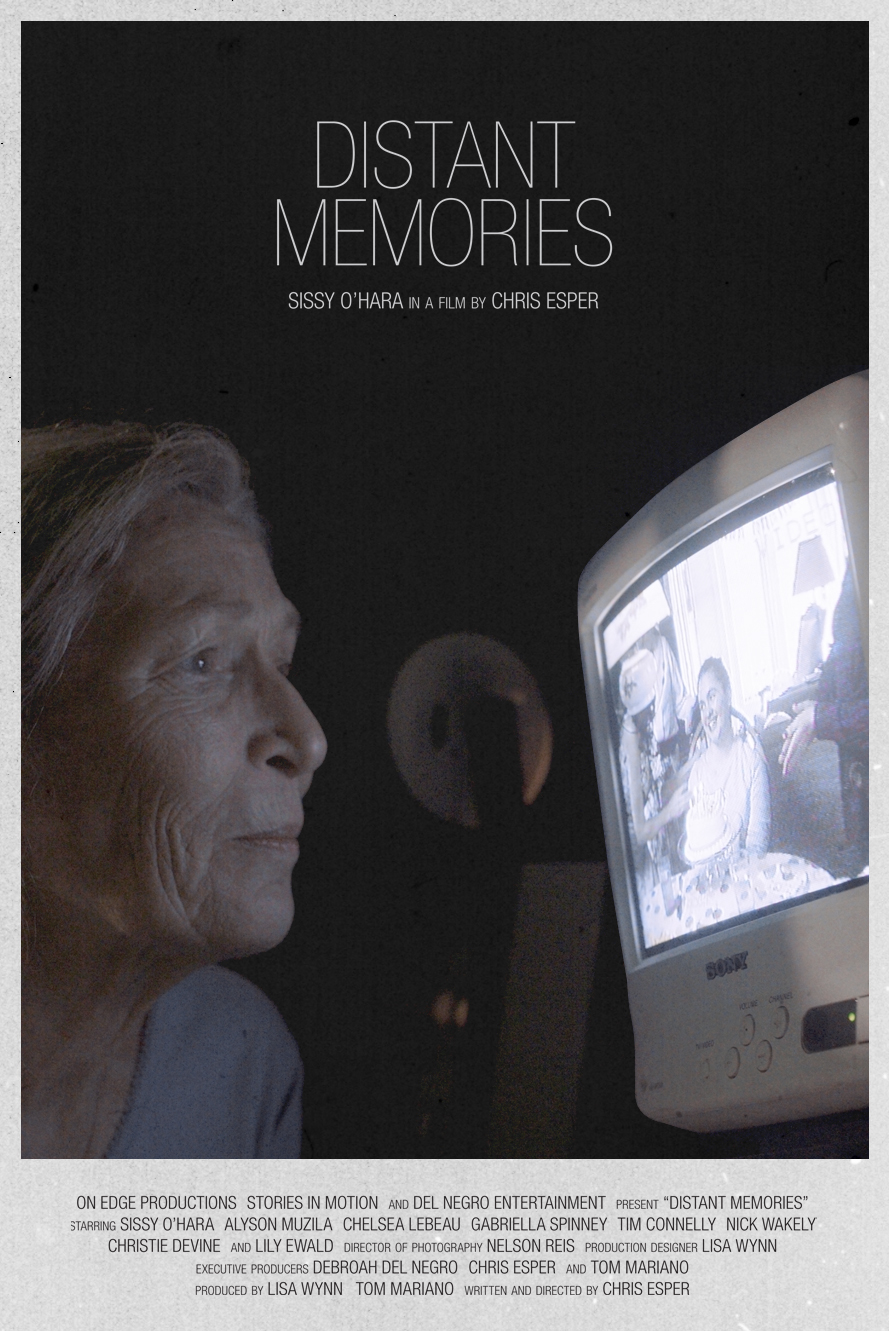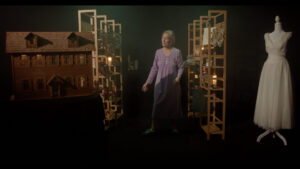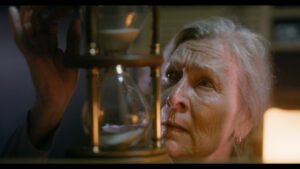
Short Film Review “Distant Memories”
WATCH THE TRAILER HERE
First, the Recap:
There is both the affecting prominence and yet sometimes the foreboding consequence of that which we hold onto within our mind’s eye. Our existence, or at least so much of it, is formed by all we take in around us and then store away within, creating that well of memories that bind us, bring us peace, joy, and the fortitude to remain functional as life proceeds, through triumph and trials. However, with such a wealth of these mental souvenirs arrayed inside, what happens when they’re suddenly, systematically, unstoppably taken away by that over which we have no control? Anna (Sissy O’Hara) frantically battles this precise scenario, even as a remorseless disease tears away at her mind, absconding with so much she treasures and tries emphatically NOT to lose forever, with the only question remaining–CAN she avoid the losses, or is it simply the struggle against inevitability?
Next, my Mind:
Unavoidably heart-wrenching yet candidly poignant, unequivocably raw yet compellingly grounded, tear-inducing yet filled with the absolutely persuasive necessity its foundational message conveys, and a complete testament to what indie cinema does best–raises awareness and stirs the soul, this new short film effort from writer/director/producer/executive producer/editor Chris Esper, producer Lisa Wynn, producer/executive producer Tom Mariano, and executive producer Deborah Del Negro strikes your very being with the force of a hurricane while becoming a reminder of just how much we need to maintain our efforts to acknowledge, care for, and continue to seek solutions for the ongoing battle against a punishing disease that so mercilessly abducts the mind of those afflicted with it while also having an equally harsh impact on those who strive to do their best to care for the loved ones suffering through it all. This is the kind of filmmaking project that, as indicated above, is SO NEEDED, even when the topic is tough to take in and face, because if we allow the importance of confronting things like this fade, we’re losing even more of ourselves.
Through beautifully creative execution that cements the deep and impactful intent the film puts forth with all-out deftness and visually engaging potency, this narrative which sees an aging woman’s inner perspective illustrating her beleaguering but resolute fight against losing all she’s accumulated over a lifetime while also portraying the additional notions of having to watch it all unfold on the outside as seen through her daughter’s eyes, there is simply no escaping the objectives the film puts forth, utilizing the mix of astutely artistic imagery and purposefully scattered moments of dialogue to paint the portrait of mental deterioration in a manner that so emphatically resonates within you as the viewer. It’s a time capsule being explored in an entirely different way, meant to bluntly make a statement while treating its subject matter with total care and full recognition of the weight it places upon those who are encountering it along with those who must endure the pain of witnessing the effects the disease has.
I feel this is what ultimately makes the film so imperative to watch and most assuredly ponder afterwards (as it DOES stick with you!), because of HOW Esper has so adeptly presented the thematic tangents that we see here that encompass the sheer confusion, desperation, frustration, volatility, and even fear associated with the ailment here, but they delves even further into how it entails someone grasping so urgently to things that should mean something, attached to memories that ARE there, yet no longer fully comprehendible, understood, or even wholly meaningful anymore DUE to the condition. The forgetfulness, how it has been building over the years leading up to this story’s current setting, plus the loss of control and sense of self or any autonomy once possessed, all get shown here to such undeniably affecting degrees. How this all culminates into the film’s third act which is just jarring and piercing to the core, much less in how its visually delivered, on TOP of how we see the effects it’s having on a caregiver’s state of being, the REALITY of it all is quite honestly, exhaustively, deliberately emotionally draining but OH so EFFECTIVE.
It’s a viewpoint of forced compartmentalization as applicable to the disease in question through flashbacks, and it only serves to BE the gripping admonition for the attention we need to retain in association with it, for treatment and requisite compassion. O’Hara is a palpable force on screen here through a performance that carries both acutely understated and formidably dynamic weight paired with a hauntingly fervent energy that elicits such a strong sense of relatability and empathy through her lead role as Anna, an elderly woman having to face the ugly and disheartening actuality of a mind-robbing malady we all know too well about. Trapped within the confining “room” of her own consistently disappearing memories , Anna strives to grasp onto every single one with a tenacity of someone about to truly LOSE all of it, cherishing and rejoicing in the moments anew yet also having to see them begin to suddenly decline and dim, slowly turning into nothing more than echoes. It’s so overtly moving and ardently intense via almost no spoken dialogue on O’Hara’s part, and this makes her performance that much more realistic and captivating throughout.
The primary supporting role arrives through Christie Devine who plays Anna’s adult daughter and longstanding caretaker (at least up to a certain point in this particular narrative’s direction) Noelle, a woman whose own handling of having to watch her beloved mother’s inexorably waning mind deteriorate further over time becoming more and more difficult to both accept and care for, which Devine portrays with equally emotive credibility. Additional supporting turns are seen here aplenty, including the depictions of Anna in differing stages of earlier ages as played by Alyson Muzila and Chelsea Hueter, her husband as played by Tim Connelly and Nick Wakely, as well as Noelle’s younger days as provided by Lily Ewald. Appearances are likewise made by Grace McDade Babikian as Anna’s mother, Gabriella Mariano and Margarita Tummings as two of the younger Anna’s friends, Carol Brodeur and Ben Alexander as family friends, and Ashley Hunt as the hospice nurse who brings events back into the actual current situation.
So, in total, “Distant Memories” is a transformative, intelligently delivered, highly necessary, unabashedly profound short film that needs to be witnessed in order to absorb the significant amount of calculated, well-designed wake-up call-level objectives it manifests and that should be heeded. May we never allow ourselves to invalidate or blatantly ignore hearing about this topic and, ideally, may this film cause us to find what actions WE can take to combat such a destructive illness that has touched far too many lives of those we treasure, so that remembrance can be salvaged and consigning to mental oblivion can be what becomes the thing to be forgotten.
STAR RATING (out of 5):
As always, this is all for your consideration and comment. Until next time, thank you for reading!




